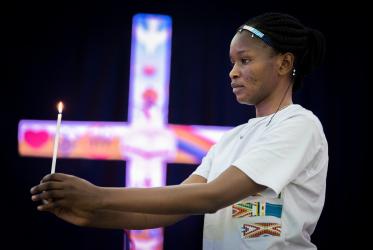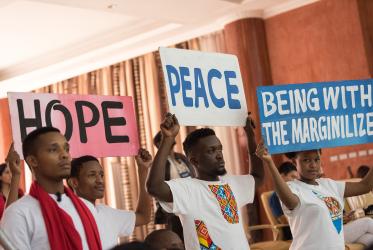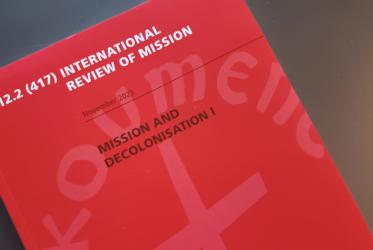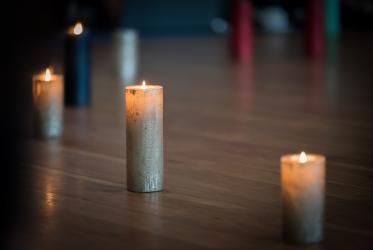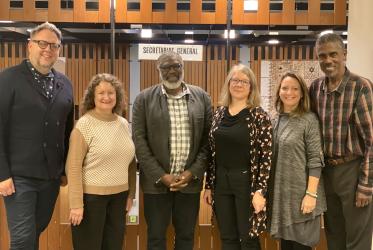By Robert Bartram*
The Council of Baptist Churches in North East India (CBCNEI) is one of the largest Baptist groups in India, including 1.2 million members in 7,263 congregations. The CBCNEI officially became a WCC member church in July. Rev. Dr Solomon Rongpi, general secretary of the CBCNEI, spoke to WCC news about the CBCNEI’s decision to join the WCC.
Why has the Council of Baptist Churches in Northeast India decided to join the WCC?
Rongpi: We want to be part of the global church as an ecumenical body. We have a long-held view that we should have become a member of the WCC. Because of the differences of doctrinal understanding, it has been a slow process.
Why have you decided to join now?
Rongpi: We have felt a great need of joining a global church because of the issues we are facing, as all the issues people are facing today are one and the same. There is a need for a united voice to resolve all the issues we are facing in the world.
Could you give an outline of the background and history of your church?
Rongpi: The history of CBCNEI began with the first American Baptist Missionaries, Nathan and Eliza Brown; Oliver and Harriet Cutter, who set their feet on the banks of Brahmaputra River at Sadiya on 23 March 1836. They were hoping to find access to China through the Shan territory but were confronted with dense jungles, active and enthusiastic tribes, and hills and plains. Believing that they had been led to a fruitful place they began to learn Assamese, set up their printing press and gave themselves to the task of translating, publishing and teaching. Thus began the work of the Baptist in eastern corners of India –the spark that initiated the beginning of CBCNEI.
What are your priorities right now?
Rongpi: We have healing ministries. There are six hospitals that are providing healthcare to the sick and the dying, located in four states in the region. They are: Tura Christian Hospital, Garo Hills, established 1908; Impur Christian Hospital, Nagaland, established 1912; Kangpokpi Christian Hospital, Manipur, established 1920; Jorhat Christian Medical Centre, Assam, established 1924; Satribari Christian Hospital, Assam, established 1926; Babupara Christian Hospital, Garo Hills, established 1949.
Then we also have justice and peace ministry. The ministry of justice and peace is engaging with and imparting information on legal rights to members of the council. The areas of justice and peace also cover religious freedom, human trafficking, women’s rights, the criminal justice system – but also food security, domestic violence, minority rights and is also engaged in peace-building and conflict transformation in places of ethnic conflict in the region. Ethnic dialogue and reconciliation programmes are also conducted amongst groups with the aim of fostering religious harmony contributing to positive social change.
Who conducts the reconciliation activities?
Rongpi: The Justice and Peace department conducts the reconciliation activities.
We also have a Mission and Evangelism ministry. This department coordinates mission activities and function as facilitators between the church, local associations and conventions. This department also organizes community development works amongst the poor and the needy in the northeast region.
How large is the church?
Rongpi: The CBCNEI has 7,516 local congregations, 100 associations, six regional conventions and four associate members. The total strength of the CBCNEI is approximately 1.2 million individuals. We cover six states of northeast India.
What are the main challenges you face?
Rongpi:
—Discrimination based on religion and race
—Nominalism – we have so many nominal Christians
—Finance constraints and sustainability
—Lack of proper infrastructures
—Forces of secularism and market culture
—Growing divide between rich and poor
—The unmindful exploitation of natural resources
—Growing tribalism – we have over 200 tribes and there is much conflict between them
—Corruption in public life
—Growing religious conflicts
What is your view of the pilgrimage of justice and peace?
Rongpi: Every human being here on earth is a pilgrim and we journey as pilgrims. We may have different understandings of God and the final destination, but everyone one of us here on earth must care for the earth with equal responsibility. We have done a lot of injustices to one another, especially women and children, the poor and helpless around the world. We have done injustices to nature, including animals and forests and over-exploited the earth’s resources. Therefore we humans have to join our hands together over this earth that God has so beautifully created.
The pilgrimage of justice and peace is about the church getting involved in advocating and doing justice and peace. This means that the church must not only speak of injustice but take action by calling the government to change their decisions if they are wrong and also encouraging society to be more caring about creation at all levels.
Council of Baptist Churches in North East India
WCC Pilgrimage of Justice and Peace
*Robert Bartram is a communications specialist with 20 years experience drawn from a range of government, inter-government and media organizations, based in Geneva.
